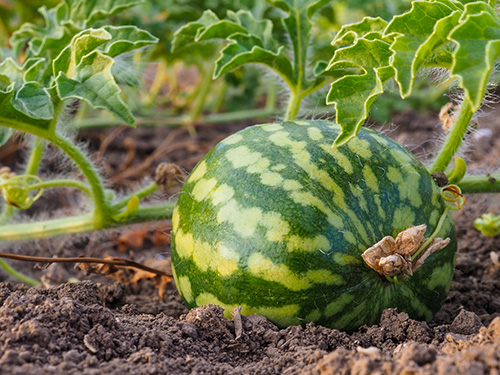Storing Your Fruit for Maximum Freshness
Aug 12, 2024

As summer reaches its peak, fruit is at its finest — bursting with flavor and ripe for the picking. Whether you’ve stocked up from the farmers market or your backyard garden, knowing how to properly store your summer fruit can make all the difference in preserving its taste and texture.
Here’s your ultimate guide to keeping your favorite fruits fresh and delicious, along with recommended storage times for the refrigerator.
Apples: 3-4 weeks
Apples are a summer staple that can last for weeks in the fridge. Store them in the crisper drawer, ideally in a plastic bag or wrapped in paper to prevent them from absorbing strong odors from other foods.
Blueberries: 1-2 weeks
Blueberries are delicate and should be kept in their original container or a breathable container to prevent mold and extend their shelf life. Rinse them just before eating.
Cherries: 4-7 days
Cherries are best enjoyed soon after purchase. Store them in a crisper drawer in a container that allows airflow to keep them from becoming mushy or moldy.
Cranberries: 3-4 weeks
Cranberries have a longer shelf life and can stay fresh in the fridge for up to a month. Store them in their original packaging or in a sealed container.
Grapes: 5-7 days
Keep grapes in their original bag or a perforated container in the fridge. Wash them just before eating to maintain their crispness and prevent spoilage.
Melons: 5-7 days
Ripe melons, such as cantaloupes and honeydews, should be covered and stored in the fridge. For best results, cut melons should be wrapped tightly in plastic wrap or stored in an airtight container.
Oranges: 2-3 weeks
Oranges can stay fresh in the fridge for a couple of weeks. Store them in the crisper drawer or a mesh bag to allow proper airflow.
Peaches: 3-5 days
Ripe peaches should be kept in the fridge but are best enjoyed soon after purchase. Store them in a plastic bag to prevent them from getting too soft.
Pineapples: 3-5 days
Once cut, pineapple should be stored in an airtight container in the fridge. Whole pineapples can stay fresh on the counter until ripe and then should be refrigerated.
Raspberries: 2-3 days
Raspberries are highly perishable. Store them in a container lined with paper towels to absorb excess moisture and keep them from becoming mushy.
Strawberries: 3-5 days
Store strawberries in the original container or a breathable container lined with paper towels. Avoid washing them until you’re ready to eat, as excess moisture can lead to quicker spoilage.
Watermelon: 2 weeks
Whole watermelons can be stored in a cool, dry place, but once cut, they should be refrigerated. Wrap the cut pieces in plastic wrap or store them in a covered container.
With these simple storage tips, you can make the most of your summer fruit, enjoying fresh and flavorful bites all season long. Co-op is your one-stop shop for garden supplies and expert advice to ensure your fruits and vegetables flourish.
Find your nearest Co-op location here. For more content like this, check out the latest issue of The Cooperator.
Here’s your ultimate guide to keeping your favorite fruits fresh and delicious, along with recommended storage times for the refrigerator.
Apples: 3-4 weeks
Apples are a summer staple that can last for weeks in the fridge. Store them in the crisper drawer, ideally in a plastic bag or wrapped in paper to prevent them from absorbing strong odors from other foods.
Blueberries: 1-2 weeks
Blueberries are delicate and should be kept in their original container or a breathable container to prevent mold and extend their shelf life. Rinse them just before eating.
Cherries: 4-7 days
Cherries are best enjoyed soon after purchase. Store them in a crisper drawer in a container that allows airflow to keep them from becoming mushy or moldy.
Cranberries: 3-4 weeks
Cranberries have a longer shelf life and can stay fresh in the fridge for up to a month. Store them in their original packaging or in a sealed container.
Grapes: 5-7 days
Keep grapes in their original bag or a perforated container in the fridge. Wash them just before eating to maintain their crispness and prevent spoilage.
Melons: 5-7 days
Ripe melons, such as cantaloupes and honeydews, should be covered and stored in the fridge. For best results, cut melons should be wrapped tightly in plastic wrap or stored in an airtight container.
Oranges: 2-3 weeks
Oranges can stay fresh in the fridge for a couple of weeks. Store them in the crisper drawer or a mesh bag to allow proper airflow.
Peaches: 3-5 days
Ripe peaches should be kept in the fridge but are best enjoyed soon after purchase. Store them in a plastic bag to prevent them from getting too soft.
Pineapples: 3-5 days
Once cut, pineapple should be stored in an airtight container in the fridge. Whole pineapples can stay fresh on the counter until ripe and then should be refrigerated.
Raspberries: 2-3 days
Raspberries are highly perishable. Store them in a container lined with paper towels to absorb excess moisture and keep them from becoming mushy.
Strawberries: 3-5 days
Store strawberries in the original container or a breathable container lined with paper towels. Avoid washing them until you’re ready to eat, as excess moisture can lead to quicker spoilage.
Watermelon: 2 weeks
Whole watermelons can be stored in a cool, dry place, but once cut, they should be refrigerated. Wrap the cut pieces in plastic wrap or store them in a covered container.
With these simple storage tips, you can make the most of your summer fruit, enjoying fresh and flavorful bites all season long. Co-op is your one-stop shop for garden supplies and expert advice to ensure your fruits and vegetables flourish.
Find your nearest Co-op location here. For more content like this, check out the latest issue of The Cooperator.